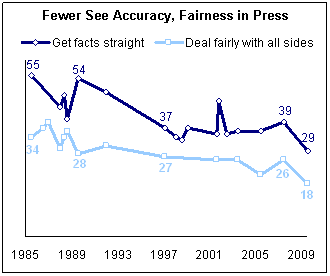Last week I wrote about my fruitless quest to alert the Wall Street Journal to a mistake it had made in a book review — misspelling the name of the author the piece mainly focused on.
Yesterday I made one final effort to close this loop; I emailed the book review’s author, Philip Delves Broughton. Broughton responded quickly and courteously, agreed that it was a mistake (one he’d been responsible for), and noted that as a freelance contributor all he could do was notify the book review’s editor.
As of today this mistake, now 11 days old, remains uncorrected. In the face of my persistent and no doubt annoying barrage of emails, phone calls, and blog posts, the Journal newsroom has remained entirely mum.
Now, there are a few ways to read this situation. You could say: Who cares? It’s just a misspelling of somebody’s name.
If it’s your name, of course, you may care a great deal. If you’re the author, you might care not just for vanity, but for the sake of the people who might be Googling your writing or looking your book up to purchase it on Amazon.
In this case, the author, Mac McClelland, happens, right now, to be doing some on-the-ground reporting from the Gulf oil spill for Mother Jones. If you were her, you might want readers to connect the book review with the in-the-news byline.
So another possible response is: The Journal’s editors and reporters are very busy people. They’ve got financial meltdowns to cover. Why are you harassing them with this trivia?
That’s just fine — unless the Journal actually cares whether its readers trust its coverage. If a news outlet can’t be bothered to get an author’s name right, can you count on it to get the financial stories right?
I’m sorry, but none of these responses is adequate. Until and unless we get a more plausible response, the only interpretation that makes sense is a very sad one: that the Wall Street Journal, once one of the world’s great trusted news institutions, lacks a functioning correction process. Or it simply doesn’t care about sweating the details any more.
UPDATE: This post is now linked to from Romenesko, and the very first comment there provides a nice illustration of my argument. Mark Jackson writes, “Really? This is a big deal to you? Column inches. Limited space. Priorities. Possibly the world financial system crashing was a bigger issue? Just sayin’.”
It seems to me that the Journal has every right to say, “We no longer have the resources to fix small errors like misspelled names. You should no longer count on us getting that stuff right.”
Something tells me no editor at the paper is likely to say that. Because when most of us signed on as journalists we signed on for the small stuff too. And readers expect that — and expect some kind of response from the newsroom when they point out an error.
[Crossposted at the MediaBugs blog]

